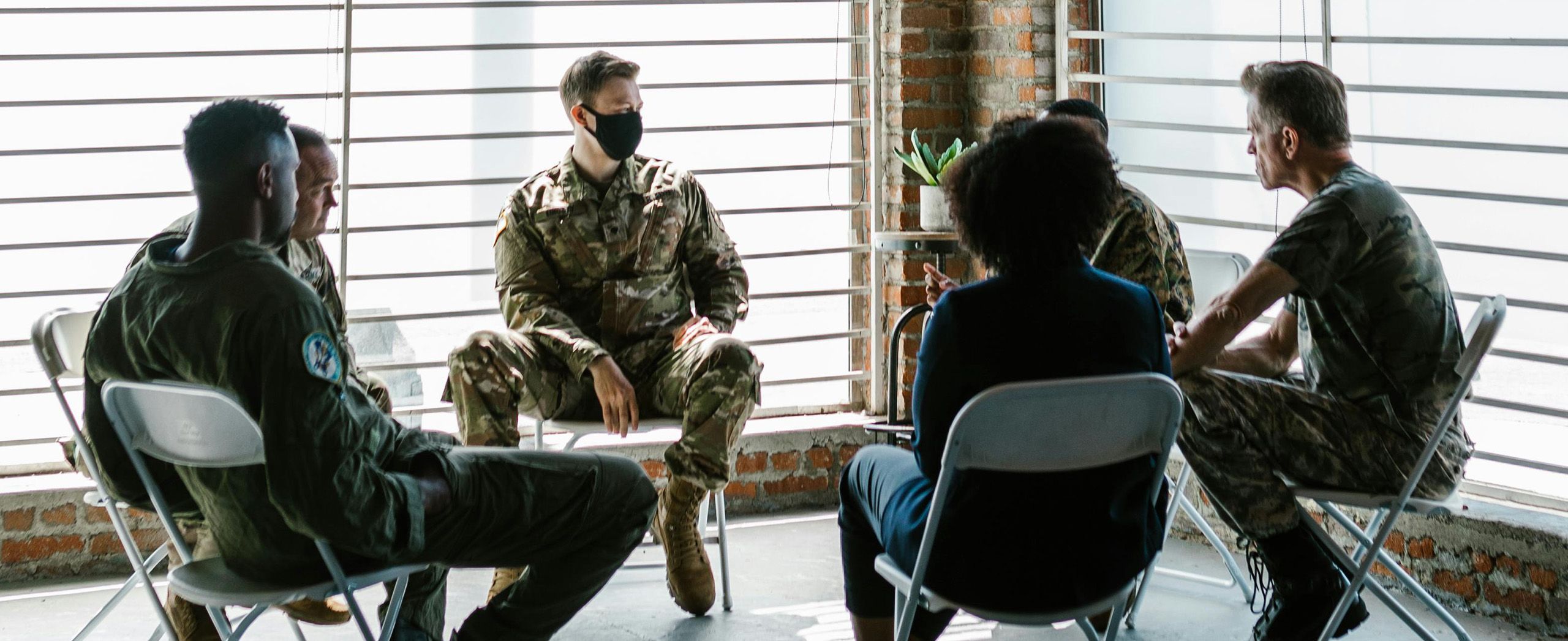Veterans & Addiction: Treatment Barriers & Rehab in Atlanta
- Home
- Veterans & Addiction: Treatment Barriers & Rehab in Atlanta
Veterans exposed to combat, hazardous materials, and other traumatic events or injuries face mental health challenges that increase their risk for developing a substance use disorder. Some turn to alcohol, street drugs, or prescription medicines to help them cope with their symptoms.
At our drug and alcohol rehab in Atlanta, we understand the special needs of veterans and addiction. We have specially trained staff and veteran-centered treatment programs to address your needs and help you overcome mental health and substance use issues.

Unique Addiction Risk Factors for Veterans
More than one in ten veterans has been diagnosed with a substance use disorder.1 The risk factors associated with addiction among veterans include deployment and being away from family, peer pressure, prior existing mental illness, reintegration stress, and post-traumatic stress disorder (PTSD).1 There is often a stigma surrounding getting help for a mental health or addiction problem, which leads veterans to avoid seeking treatment.1
Additionally, military men and women may experience injuries that cause chronic pain. To cope, they may use prescription opioids, which are known to lead to dependence and addiction.1 As reported by the National Institute on Drug Abuse, while deployment is associated with unhealthy drinking and drug use, leaving and being discharged from the military is when the concern for addiction increases.1
Veteran PTSD and Substance Use
PTSD and addiction are real problems today. According to the National Center for PTSD, 7 out of every 100 veterans will experience PTSD. That’s 7% of military personnel. Of that number, 13% tend to be female, and 6% tend to be male. However, that may fluctuate due to underreporting.2 The high number of PTSD cases among veterans is likely related to combat, service injuries, and witnessing trauma.
PTSD is a mental health disorder that occurs when someone experiences or witnesses something they are not prepared to handle psychologically. PTSD symptoms are broken into four clusters: intrusion, avoidance, negative alterations in cognition or mood, and alterations in arousal and reactivity.3
Common symptoms include intrusive memories of traumatic events, feelings of isolation, nightmares or flashbacks, distorted perceptions, and negative thinking. Additionally, some people with PTSD are easily startled, avoid social activities, and may have suicidal ideations.3
To cope with their symptoms, many people use drugs and alcohol, which alter thoughts, feelings, and actions. While self-medicating with substances can work temporarily, it can lead to adverse consequences, such as dependence and addiction.3
Chronic Pain and Opioid Misuse Among Veterans
The National Center for Complementary and Integrative Health reports that veterans experience chronic pain more than non-military men and women.4 Chronic pain is the result of injuries and persists even after you receive treatment. It can last for years and interfere with your ability to function physically and psychologically.4
The most common types of chronic pain among veterans include jaw pain, back pain with sciatica, neck pain, migraines, joint pain, and all other types of back pain.4 Doctors often prescribe opioids to help veterans ease their pain from service-related injuries. Unfortunately, liberal prescribing can lead to dependence on the drug. Some contend that being prescribed opioids for pain leads to opioid use disorder.5
Veterans eventually might misuse opioids to avoid pain and avoid withdrawal symptoms that follow a sudden stop of opioid use. Due to the misuse of opioids among veterans, fatal overdoses have increased by over 50% in the last few years.5
Military Culture and Drinking
Specific military characteristics and experience have been linked to high rates of veteran alcohol abuse. Some of the traits include service type, deployment status, and rank. In addition, peer pressure, adverse combat experiences, mental health, and social issues play a role.6
Cultural factors affect someone’s likelihood of developing a substance use disorder. Cultural factors in the military include the lure created by drinking establishments, acceptance of alcohol use, conformity, if personnel are connected to religious services, and their social networking. Those with PTSD tend to have higher rates of drinking.6
Military Reintegration Stress
Reintegration refers to the transition a military member makes from active duty to civilian life. Returning home after deployment can be particularly stressful, and many may notice an increase in psychological adjustment challenges. Some may develop or experience a worsening of mental health disorders, while others may have suicidal ideations.7 These disorders and ideations can increase the risk of someone misusing alcohol or drugs to cope with the changes that occur after deployment.
Reintegration stressors often include marital problems, financial struggles, identity and purpose, and loss of belonging. Additional stressors may include sleep disturbances, cultural differences, and finding employment.5 Post-deployment, veterans may misuse alcohol to cope with mental health symptoms due to their experiences. Life stressors that occurred while they were deployed may amplify their symptoms, giving them more incentive to drink alcohol to cope.8

Our team are waiting to answer any questions you might have
Addiction Statistics Among Veterans
The National Survey on Drug Use and Health of Adult Veterans revealed that 4 in 10 struggle with illicit drug use, 7 in 10 struggle with alcohol misuse, and 1 in 8 misuse both alcohol and drugs. The survey also revealed that in 2020, 5.2 million veterans had either a mental health or substance use disorder. Some have co-occurring disorders, meaning they have both a substance use disorder and a mental health disorder.9
Marijuana was the most misused substance among veterans, followed by prescription medicines, methamphetamines, cocaine, hallucinogens, inhalants, and heroin. Pain relievers, like opioids, account for the most misused prescription medicines.9
Most substance misuse occurs among those veterans aged 18 to 25. Depression, anxiety, and suicidal thoughts are the most common mental illnesses associated with veterans who have a dual diagnosis. This age group also has higher rates of substance misuse compared to civilians of the same age. Veteran and active duty males, specifically, tend to have higher rates of alcohol use disorders compared to civilians.9
Barriers to Addiction Treatment for Veterans
Barriers to addiction treatment for veterans may be based on perceptions, attitudes, or structural or practical reasoning. Perceptual barriers include stigma in the military culture of being weak for seeking treatment. Some veterans do not perceive they need treatment or feel like they have a problem or fear of dishonorable discharge.10
Attitudinal barriers include feeling their symptoms are not severe enough to seek treatment, or they may think they will go away with time, on their own. Some may struggle with pride and believe they should be able to recover on their own without the help of others. Internalized stigma may also be a barrier. They don’t want to be perceived as weak or be treated differently because of an illness.10
Practical or structural barriers include financial struggles and high costs of treatment, a lack of veteran-focused programs, and a lack of understanding of their allowable benefits.10
Effective Addiction Treatment for Veterans
The most effective addiction treatment for veterans includes an integrative approach that combines various therapies, including behavioral therapies, like cognitive behavioral therapy (CBT), exposure therapy (ET), and motivational interviewing (MI). These therapies can help veterans change negative thought patterns that support substance misuse.11
Behavioral therapies work best when combined with dual diagnosis treatment for those with depression, anxiety, and post-traumatic stress symptoms. Treating mental health and addiction simultaneously will increase the chances of long-term recovery. Peer support is essential to recovery, and group counseling with other veterans, as in self-help groups, helps them realize they are not alone, provides feedback from other veterans, and offers valuable tips on how to overcome daily challenges.11
Some veterans with a substance use disorder may benefit from medication-assisted treatment (MAT) that uses FDA-approved medications to ease withdrawal symptoms. Medicines can help stabilize patients and manage withdrawal symptoms, allowing them to focus on learning the skills necessary for recovery.11
Addiction Treatment for Veterans in Atlanta
As a veteran, you may have experiences from when you were in active duty that are impacting you now. Or you may be struggling to cope with the changes that occurred upon your return. Misusing alcohol and drugs may offer a temporary relief, but over time, they will likely worsen your symptoms.
Empowered Recovery Center provides personalized addiction treatment for veterans in Atlanta. We accept TRICARE insurance, which covers a wide range of TRICARE addiction treatment-related services for veterans. We offer trauma-informed care through CBT and many other behavioral therapies, as well as dual diagnosis treatment, so that you can overcome mental health and substance use disorders simultaneously.
The first step in getting treatment is to contact our admissions department. Our admissions team can help you determine how to pay for a veteran’s drug rehab and verify your insurance coverage. Finally, we offer a variety of programs with varying intensities. Once you are stable, you may transition into one of several outpatient programs, such as partial hospitalization programs (PHPs), intensive outpatient programs (IOPs), virtual IOPs, standard outpatient rehabilitation, and aftercare.
To begin your recovery journey, contact one of our team members. They can answer your questions about our programs, rehab costs, and even verify your insurance benefits. We can help you get back to living a life free from addiction.
References
- National Institute on Drug Abuse. (2019). Substance use and military life. Retrieved on September 15, 2025, from https://nida.nih.gov/publications/drugfacts/substance-use-military-life.
- U.S. Department of Veterans Affairs PTSD: National Center for PTSD. (2025). How common is PTSD in veterans? Retrieved on September 15, 2025, from https://www.ptsd.va.gov/understand/common/common_veterans.asp.
- Chambliss, T., Hsu, J. L., & Chen, M. L. (2024). Post-traumatic Stress Disorder in Veterans: A Concept Analysis. Behavioral sciences,14(6), 485. https://doi.org/10.3390/bs14060485. Retrieved on September 15, 2025, from https://pmc.ncbi.nlm.nih.gov/articles/PMC11200391/#sec4-behavsci-14-00485.
- National Center for Complementary and Integrative Medicine. (2025). Pain: U.S. military and veterans. Retrieved on September 15, 2025, from https://www.nccih.nih.gov/health/pain/veterans.
- Bennett, A. S., Guarino, H., Britton, P. C., O’Brien-Mazza, D., Cook, S. H., Taveras, F., Cortez, J., & Elliott, L. (2022). U.S. Military veterans and the opioid overdose crisis: a review of risk factors and prevention efforts. Annals of medicine, 54(1), 1826–1838. https://doi.org/10.1080/07853890.2022.2092896. Retrieved on September 15, 2025, from https://pmc.ncbi.nlm.nih.gov/articles/PMC9262363/.
- Osborne, A. K., Wilson-Menzfeld, G., McGill, G., & Kiernan, M. D. (2022). Military service and alcohol use: a systematic narrative review. Occupational medicine (Oxford, England), 72(5), 313–323. https://doi.org/10.1093/occmed/kqac045. Retrieved on September 15, 2025, from https://pmc.ncbi.nlm.nih.gov/articles/PMC9272263/.
- Romaniuk, M., Fisher, G., Kidd, C., & Batterham, P. J. (2020). Assessing psychological adjustment and cultural reintegration after military service: development and psychometric evaluation of the post-separation Military-Civilian Adjustment and Reintegration Measure (M-CARM). BMC psychiatry, 20(1), 531. https://doi.org/10.1186/s12888-020-02936-y. Retrieved on September 15, 2025, from https://pmc.ncbi.nlm.nih.gov/articles/PMC7654614/.
- Banducci, A.N., McCaughey, V.K., Gradus, J.L., & Street, A.E. (2019). The associations between deployment experiences, PTSD, and alcohol use among male and female veterans. Addictive behaviors, 98. https://doi.org/10.1016/j.addbeh.2019.106032. Retrieved on September 28, 2025, from https://www.sciencedirect.com/science/article/abs/pii/S0306460319302837.
- Substance Abuse and Mental Health Services Administration (SAMHSA). (2022). 2020 National survey of drug use and health: Veteran adults. Retrieved on September 15, 2025, from https://www.samhsa.gov/data/sites/default/files/reports/rpt37926/2020NSDUHVeteransSlides072222.pdf.
- U.S. Department of Veterans Affairs. (n.d.). Help veterans overcome barriers to mental health treatment. Retrieved on September 15, 2025, from https://www.mentalhealth.va.gov/suicide_prevention/docs/FSTP-Barriers.pdf.
- Teeters, J. B., Lancaster, C. L., Brown, D. G., & Back, S. E. (2017). Substance use disorders in military veterans: prevalence and treatment challenges. Substance abuse and rehabilitation, 8, 69–77. https://doi.org/10.2147/SAR.S116720, Retrieved on September 17, 2025, from https://pmc.ncbi.nlm.nih.gov/articles/PMC5587184/.
Program Links
Take The First Step Towards Your Journey To Recovery
Check Your Insurance Benefits
Empowered Recovery Center is dedicated to providing addiction treatment services to the greater Atlanta area including Acworth, Alpharetta, Canton, Cartersville, Kennesaw, Marietta, Powder Springs, Sandy Springs, and more.
Resources
Connect With Us
-
Empowered Recovery Center
3651 Canton Road,
Marietta, GA 30066
